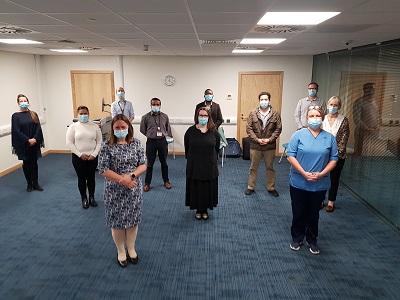
A specialist stroke treatment delivered at Ninewells Hospital in Dundee is now being extended to benefit patients admitted to Aberdeen Royal Infirmary.
NHS Tayside introduced a pilot mechanical thrombectomy service in November 2020, which was the first of its kind in Scotland. A number of patients have already greatly benefited from the treatment which physically removes blood clots from blocked arteries in the brain.
Honorary consultant interventional radiologist Professor Graeme Houston, who leads the North of Scotland thrombectomy service, said, “Thrombectomy can greatly improve recovery for patients who suffer a stroke by reducing disabilities such as paralysis or loss of speech.
“The first year of this service at Ninewells has been very positive and we’re pleased to now be able to offer this life-changing treatment to patients from Grampian, benefiting many more people in the North of Scotland.
“In those patients who are suitable to receive thrombectomy, the treatment is most effective in the first few hours after a stroke, therefore anyone who has symptoms of a stroke should seek urgent help by dialling 999 to get assessment and treatment as quickly as possible.”
The treatment is performed by interventional radiologists, supported by radiographers and the radiology nursing team. Patient care before, during and after the procedure is provided by the stroke, anaesthesia and intensive care unit teams at Ninewells.
This next stage of the pilot sees the service rolled out to cover the Aberdeen Royal Infirmary area, followed next year by other hospitals and NHS Boards across the North of Scotland. The aim is to provide a 24/7 regional service by 2023.
The Ninewells service will be part of a national network of three regional centres along with Glasgow and Edinburgh, which will provide thrombectomy for the West and East of Scotland regions.
Lead clinician at Aberdeen Royal Infirmary John Reid said, “We are delighted patients in Grampian will be able to benefit from this pilot.
“Evidence shows this treatment can vastly improve outcomes for certain stroke suffers and that has already been shown to be the case in many of those who have received the care at Ninewells.
“We’d like to thank our colleagues in Tayside for involving us and our patients in this pilot.”
John Watson, Associate Director for the Stroke Association in Scotland, said, “This is very good news indeed for stroke patients in Grampian. For patients who are eligible, it’s no exaggeration to say that some will now have a future without disability as a result of this astonishing procedure being available to them.
“Around one in every three people who receive thrombectomy after their stroke will be less disabled as a result. Around one in five will be able to function completely independently afterwards.
“It’s a real team effort to make thrombectomy happen. Huge credit to the team at Ninewells, and our thanks to everyone at Aberdeen Royal Infirmary, the Scottish Ambulance Service and all those involved for their work so far on the pilot service for the North.”